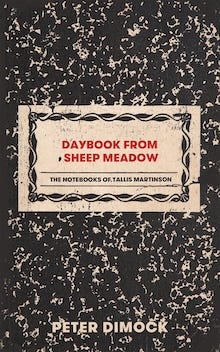In my ongoing attempt to digitize as many of the old Context articles as possible, below you’ll find Peter Dimock’s “The Presence of Reading” from issue no. 2, first published, I believe, in late 1999 or early 2000.
This is dense piece that’s as relevant today as it was when it first came out, although the issue that Dimock is exploring has only become more exacerbated, more extreme. It’s a piece I’ve thought about hundreds of times over the past decades, especially the concept of the purchasing of a book—thanks in large part to its packaging—standing in for a close reading of the text.
Peter Dimock, who is one of the most brilliant and kindest people I’ve ever met, is a former editor at both Random House and Columbia University Press, was a long-time Dalkey Archive board member, and is the author of three novels: A Short Rhetoric for Leaving the Family, George Anderson: Notes for a Love Song in Imperial Time, and Daybook from Sheep Meadow.
Enjoy!
In 1959, in a letter to a friend, Marshall McLuhan oracularly announced the annulment of the organizing temporality created by the book and the tradition of reading it sustained. He wrote, “When all the world becomes a computer and all the world’s cultures are recorded on a single tribal drum, the fixed point of view of print culture becomes irrelevant and impossible, no matter how valuable.” In retrospect, the irritating imprecision and preposterous sweep of this pronouncement are matched only by its prescience. Forty years later, it may be time to consider again the presence of reading under the new dispensation of cybernetic coordination and integration of all technologies and traditions of representation.
McLuhan’s grandiloquent remark stresses the obsolescence of the socially shared temporality of presence created by the fixed continuity and linear historical perspective rhetorically established by book culture and its associated discursive institutions. In breaking from it, some would argue that we have been released from the constraints of representation imposed by book culture’s rhetorically structured assumptions and models of deliberative agency and accountability into the promise and terror of the “information age.” I will not try to address the enormous question of the nature of rhetoric, agency, and the practice of literature in our contemporary context of cybernetic technocratic determination. But McLuhan’s pronouncement haunts me. It allows, I think, the formulation of more manageable questions. How is the value of traditional book culture and its interpretive practices to be constituted and realized in the context of a different, electronically mediated and administered social temporality? What becomes of the presence established by the tradition of book culture in the context of modes of determination and representation the rhetorical tradition of the book cannot assimilate or accommodate without a transformation so profound as to constitute that tradition’s effective dissolution? (These are the crucial questions that lurk, I think, inside McLuhan’s gnomic and deceptively casual phrase, “no matter how valuable,” quoted above from his letter.)
Such questions invite a level of abstraction that may try a reader’s patience. I will try to give them force with an anecdote from my experience as an editor working in commercial publishing at Random House. My argument is that print culture’s traditional time of reading can no longer be assumed, and that therefore the presence established by the tradition of the book may need to be protected in new ways in order to be preserved.
The need to distinguish and protect the presence established by the book and its reading in the context of contemporary media culture suddenly seemed quite clear to me during a recent publishing meeting at Random House. We were deciding how to publish the next season’s list of trade paperback titles at Vintage Books when, without warning, I felt a strange kind of panic. I realized I had just had the following insight: we were discussing how to present each book to the consumer so that the purchase and possession of the book promised the experience of having had an original and deep rhetorical engagement with its text. We were subliminally promising the buyer, through our packaging and accompanying synoptic copy, that no difficult intellectual effort would be required. We were promising that the sensation and the effect of intellectual and aesthetic engagement—the value of having read the book (slowly, deeply, richly, challengingly, threateningly)—were available by merely buying it. The book’s aesthetic, intellectual, moral, and emotional impact was a commodity that could be packaged and sold on the commercialized market of cultural exchange independent of any provision for the real time of readers reading pages within a protected, contemplative silence shaped to contain and foster deliberation and accountable agency. We in the room were corporate actors acting as if the presence and the time assumed by book culture within which to constitute and value meaning through rhetorical forms and their traditions were vestigial. We were in the business of realizing the value of the book’s time and presence through selling their aura as markers of a leisured authenticity sponsored by, and available to consumers through, corporate coordination and administration of representation itself. Our goal was to realize their value on the exchange of intellectual fashion that operated in synchrony with, and at the speed of, a cybernetic and electronic immediacy deeply inimical to the rhetorical time of traditional book culture.
We were subliminally promising the buyer, through our packaging and accompanying synoptic copy, that no difficult intellectual effort would be required.
I realize that the sharpness of the distinction between “book culture” and an administered technocratic “electronic immediacy” will appear to many as willful at best and at worst a blind and self-interested nostalgia for something that never was. Reading and the electronic image now coexist seamlessly after all, and the latter grew from the former in an inevitable way. The tensions between culture and selling culture are at least as old as the capitalist form of exchange. Many will argue that the value of book culture has only been expanded and democratized by the information revolution. Cybernetics will be represented by many as an expansion of book culture’s possibilities and a creative challenge to extend print culture’s representational arsenal. Any transformation in the cognitive economy or temporality of reading should be seen as merely development within literacy’s continuous historical change. Such arguments would continue with the contention that to represent recent developments in that history as a profound break would be a misguided failure of perspective. The computer, such arguments will insist, enormously expands access to literacy and its benefits.
But I want to take the position that the distinction is worth making and drawing starkly. I believe it is important to distinguish the interpretive community assumed by “print culture” as a rhetorically constituted form of interchange and agency from the commodification of the authority of the book and its deployment within a time organized by the immediacy of the electronic image and the computer screen. Only if the social times each represents can be distinguished will it be possible to address the haunting question left us by McLuhan’s announcement of the end of print culture’s communicative dominance. How is the value of print culture’s point of view to be registered—perhaps even preserved—in the context of its contemporary “impossibility” and “irrelevance”? I do not pretend to have an answer. But I do think it is important to ask, and to preserve the ability to ask, this question.
Not least among the advantages of stating the question in this stark way is that it forces us beyond the comfortable distinction we who work with books are used to making between profit and nonprofit publishing. With the advent of the new technologies, the differences, however important they still may be in many ways, fail to represent or safeguard a distinction in the imaginative presence, temporality, and interpretive community of the book, as opposed to the organization of temporality established by the electronic image. The efficiencies and intensities made possible by the applied technocratic logic of cybernetics within the culture as a whole ensure that the time of reading and the rhetorical community assumed by traditional book culture cannot compete against the digitized time of administrative power. The presence of reading cannot compete against the time of permanent, discontinuous, wired attention produced by immersion within the representational economy of contemporary media. The institutions of traditional book culture, private and public, profit and nonprofit, are now governed by the same logic and temporality that have undermined the point of view underlying traditional print literacy. To ask them to reconstitute the interpretive community of traditional print literacy without addressing the contradiction between the traditional time of reading and the contemporary time of the electronic image is to refuse to engage the question of the role and value of the book in contemporary culture.
Print culture established a distinctive and valuable temporality and interpretive presence of reading whose predominant authority as a deliberative system for establishing and constituting value can no longer be assumed. How the value of traditional print culture is to be realized in the present context of the representational power of the electronic image is an important and uncertain question. The presence of traditional reading needs both institutional protection and intellectual defense it now lacks.
A teacher once told me that a hallmark of a modernist work was that it was burdened with the obligation to teach the reader how to read its own pages. This was because literature could no longer assume the existence of a shared rhetorical and interpretive tradition. I have become increasingly persuaded that one way to realize the value of the book in a work of literary fiction is to incorporate the problem of reading and the nature of the presence it establishes within the formal structure of the work itself. This formal exercise allows the book to register for the reader the pressures print culture is under to be assimilated to and absorbed by the culture of electronic immediacy. The pressures to characterize this absorption and assimilation as inevitable and benign—as part of a seamless continuity of expanding communicative powers—are enormous. But to accede to the demands of these pressures without argument is a mistake. To do so risks the dispossession of precisely the time and presence of reading that distinguishes the book and its tradition of print culture as integrally valuable—no matter how “irrelevant and impossible” they may appear in the context of the newly dominant culture of the electronic image.
The lip service paid to the value of reading and the intensity with which the glamour of the authenticity it represents is commercially pursued attest to its lingering force as a cognitive ideal. The psychological texture of that ideal was perhaps once almost perfectly captured by George Eliot in Middlemarch when she wrote, “If we had a keen vision and feeling of all of ordinary human life, it would be like hearing the grass grow or the squirrel’s heart beat, and we should die of that roar which lies on the other side of silence.” If the ideal of Victorian, middle-class reading established a contemplative silence within ordinary life in which its violence could be intuited, partially acknowledged, and simultaneously defended against by its chroniclers, the dismantling of that silence by the white noise of the contemporary permanent present of electronic immediacy represents an unimaginable dispossession.
“The Presence of Reading” by Peter Dimock first appeared in Context no. 2 published by Dalkey Archive Press circa 1999.







Yes, prescient, indeed. The Book continues to separate an intellect, vibrant and alive, from contemporary culture; its gap expands to be filled only with more books, a pile of literature for those who value a contemplative in between, and that's alright. Will the book disappear as our collected words fade into forgotten for the visual, perpetual feed within thumbs reach as technocrats and their lackeys take ownership of imagination, thought, obliterating personal truths and lies to strengthen their own power, where history of culture becomes obsolete, all culture exists and mutates contemporaneously, no longer temporally, in the feedback loop of the feed?
We need real librarians involved in the selecting and distribution of e-books. I can't even select and purchase any type of books, electronic or physical copies, in alphabetical order, separated by genre. There is so much advertising and lists being created by new and what are considered popular books insteaded of alphabetical order. It's disgusting. They need to hire librarians when they are creating book related technology. They also need to include instruction manuals to help consumers and researchers to make use of their new technology. I miss the alphabet.